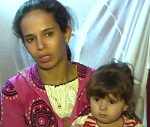[symple_box]
 International columnist, political analyst and senior journalist Ahmed Mohiuddin Siddiqui’s articles are published across Asia, Africa and Europe. He writes for The Moroccan Times, The Tunis Times, India Tomorrow, Kohram News, The Etemaad Urdu Daily and for news papers published from Muscat, Sultanate of Oman. You can follow him on Twitter at: @journopolana[/symple_box]
International columnist, political analyst and senior journalist Ahmed Mohiuddin Siddiqui’s articles are published across Asia, Africa and Europe. He writes for The Moroccan Times, The Tunis Times, India Tomorrow, Kohram News, The Etemaad Urdu Daily and for news papers published from Muscat, Sultanate of Oman. You can follow him on Twitter at: @journopolana[/symple_box]
Muscat, Sultanate of Oman—Mother’s Day was celebrated all over the world, particularly in the West few days ago. The Westerners do not have time for their parents. Hence, they have assigned two days in a year for them, one for the mother and another for the father. All the outpourings of love and affection are reserved for these two days only. The growing number of old age homes in different Western countries reflect the amount of attention old parents get in the said countries these modern times.
The celebration of Mother’s Day is more than a century old. It was actually founded for mourning women to remember fallen soldiers and work for peace. In 1850, Ann Reeves Jarvis held Mother’s Day to improve the sanitary conditions and to fight infant mortality. When the celebration became commercial, Ann’s daughter Anna Jarvis gave everything to fight it. Anna died penniless and broken in a sanitarium.
The former President of the United States Woodrow Wilson officially set aside the second Sunday in May 1915 as a Mother’s Day. West Virginia Wesleyan’s Antolini whose Ph. D dissertation was entitled “Memorializing Motherhood: Anna Jarvis and the Defense of Her Mother’s Day” says that this occasion wasn’t to celebrate all mothers, but rather to celebrate the best mother you’ve ever known – your mother – as a son or a daughter.
Today, Mother’s Day has became fully commercialized. As a matter of fact, according to the U. S National Restaurant Association, Mother’s Day is the year’s most popular holiday for dining out. More than 133 million Mother’s Day cards are exchanged annually.
The Arab world celebrates Mother’s Day on the 21st March each year while it is celebrated in Panama on the 8th December, and on the 12th of August in Thailand. Flowers and gifts are showered on mothers followed by dinners at restaurants. People do not seem to realize that all the days in a year belong to mothers, the source of our existence. Mothers symbolize all the goodness in this world. They sacrifice everything for the sake of their children.
The Holy Quran and the traditions of the Prophet Muhammed (Peace Be Upon Him) accorded a very high status to mothers.
‘‘And We have enjoined on man [to be good] to his parents: in travail upon travail did his mother bear him and his weaning was over two years. Be thankful to Me and to your parents, unto Me is the final destination’’ (Noble Quran 31: 14)
‘‘Worship God and join not any partners with Him; and be kind to your parents…” (Noble Quran 4: 36)
The Almighty Allah recognized the difficulties and pain the mothers endure while delivering and later raising their children. He commanded human beings to worship Him alone and be kind and thankful to parents.
Hadhrat Abdullah Ibn Abbâs (May Allah be pleased with him), a companion of the Prophet Muhammed (PBUH) and a great scholar of Islam, considered kind treatment of one’s mother to be the best deed for strengthening or rectifying one’s relation with God. He said: I know of no other deed that brings people closer to Allah than kind treatment and respect towards one’s mother. [Al-Adab al-Mufrad Bukhârî 1/45]
Hadhrat Abdullah Ibn Umar (May Allah be pleased with him), another companion of the Prophet Muhammed (PBUH), saw a Yemeni man performing Tawâf (circumambulating the Ka’bah) while carrying his mother on his back. This man said to Abdullah Ibn ‘Umar, “I am like a tame camel for her! I have carried her more than she carried me. Do you think I have paid her back, O Ibn Umar?” Abdullah Ibn Umar replied, “No, not even one contraction!!” [Al-Adab al-Mufrad Bukhârî 1/62]
Prophet Muhammad (PBUH) said:
There will come to you with reinforcements from Yemen a man called Uways ibn ‘Âmir of the clan of Murâd from the tribe of Qaran. He had leprosy but has been cured of it except for a spot the size of a coin. He has a mother and he has always treated her with kindness and respect. If he prays to Allah, Allah will fulfill his wish. If you can ask him to pray for forgiveness for you, then do so. [Sahîh Muslim 16/95]
Indeed, later on Hadhrat Umar ibn al-Khattâb (May Allah be pleased with him) met Hadhrat Uways (May Allah be pleased with him) who was exactly as the Prophet described, and upon Hadhrat Umar’s request Hadhrat Uways prayed for him.
A man came to the Prophet Muhammed (PBUH) and said, ‘O Messenger of Allah! Who among the people is the most worthy of my good companionship? The Prophet said: Your mother. The man said, ‘Then who?’ The Prophet said: Then your mother. The man further asked, ‘Then who?’ The Prophet said: Then your mother. The man asked again, ‘Then who?’ The Prophet said: Then your father. (Bukhari, Muslim).
The above traditions point out clearly to the great status accorded to mothers in Islam.
Hadhrat Zayn al-‘Abidîn (May Allah be pleased with him) was the great grandson of the Prophet Muhammad (PBUH) and also a renowned Islamic scholar. He used to treat his mother with so much kindness and love as seen in the following narration:
Once he was asked, ‘You are the kindest person to your mother, yet we have never seen you eating with her from a single dish.’ He replied, ‘I fear that my hand would take what her eyes have already seen in the dish, and then I would be disobeying her’. [At-Tartushi, Birr al-Wâlidayn]
In other words, Hadhrat Zayn al- ‘Abidin was so careful not to disobey his mother that he would even avoid eating out of the same plate as her; he thought that she would see a morsel and intend to take it, but before she did he might unknowingly take that same morsel and eat it. This is how careful he was to obey his mother in the most-minute details.
A well-known Sufi saint of Iran, Hadhrat Bayazid Bistami (May Allah have mercy on him) was sighted in a dream of one of his friends. The friend asked him, what could be the reason that Allah has accorded you a high place? Hadhrat Bistami replied that it could be because of his love and service to his mother.
Iran is a very cold country. Once, Hadhrat Bistami’s mother asked for drinking water during the night. Before her son could fetch water, the mother went back to sleep. The dutiful son did not wake her up but waited till his mother woke up again. Hadhrat Bistami held the glass of water made of clay in his hand throughout. When the mother woke up, he only then gave her water, though the clay glass of water was stuck in his hand and the skin of his palm came out due to the freezing cold when he tried to pull the glass!
How many devoted sons like Hadhrat Zayn al-Abedin and Hadhrat Bistami do we find today? Prophet Muhammed (PBUH) said, ‘paradise lies under the feet of the mothers.’ It means that if one pleases his or her mother with love and service, Allah will be pleased to grant paradise to such people. All sons and daughters who aspire for paradise must serve their parents and particularly their mothers with all due respect and devotion.
Dumping mothers and fathers at old age homes and not serving them will close the road to paradise. The Mother’s Day is not just a one day celebration. In Islam, Every Day is Mother’s Day! May Allah bless my parents and accept this humble offering of this writing from me to open the hearts and minds of all sons and daughters to serve their mothers and fathers and attain paradise. Aameen.





